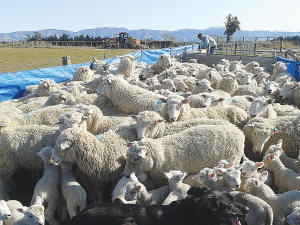Move over ham, here comes lamb
It’s official, lamb will take centre stage on Kiwi Christmas tables this year.
 Heavily in-lamb ewes carrying multiple lambs need to have a minimum of 1400kgDM/ha of pasture underfoot at any stage to optimise their dry matter intake.
Heavily in-lamb ewes carrying multiple lambs need to have a minimum of 1400kgDM/ha of pasture underfoot at any stage to optimise their dry matter intake.
Severe feed shortages in parts of the country mean many ewes are on a nutritional knife-edge heading into lambing and could be at risk of developing metabolic disorders.
PGG Wrightson veterinarian Charlotte Westwood says going into set-stocking, some farmers will be considering transitioning stock from a high energy, starch-containing feed – such as sheep nuts or grain – onto a post-drought, lush leafy pasture-based diet.
She warns that this dietary change could put ewes, particularly multiple-bearing ewes, at risk of developing metabolic disorders such as sleepy sickness, milk fever and possibly grass tetany. Particularly if there’s not enough pasture available to ewes.
While there are mineral and vitamin deficiencies associated with these metabolic disorders, Westwood says it ultimately comes down to an absolute lack of pasture, in that ewes are simply not getting enough of all nutrients in their diet – energy, protein, vitamins and minerals.
“So it becomes a bit academic about whether it is sleepy sickness causing milk fever or the other way around.”
Heavily in-lamb ewes carrying multiple lambs need to have a minimum of 1400kgDM/ha of pasture underfoot at any stage to optimise their dry matter intake, a challenging requirement for many people this winter.
In regions such as Hawke’s Bay, these pasture covers are not possible this season. Many farmers are having to consider continuing to feed out supplements, such as sheep nuts or grain over lambing.
“Although this is an excellent way to maintain feed intake for ewes, daily feeding out of supplements to set stocked ewes increases risk of mis-mothering between a ewe and her lambs.”
Westwood recommends farmers take an “aircraft oxygen mask” approach. First prioritise the ewe so she is better able to look after her lambs.
“If a ewe ends up with sleepy sickness and/or milk fever, her unborn lambs are at real risk,” she says. “We need to first look after the ewe then follow through with ways to protect any mis-mothered lambs.”
But feeding out supplements and keeping a close eye on wellbeing of new-born lambs could also mean more intensive shepherding over the lambing period, which in itself increases the chances of mis-mothering.
More disruption of set-stocked ewes during feed out of supplements could result in more orphan lambs this season, which adds extra cost, labour and stress after what has already been a very long year.
Farmers could consider setting up hand-rearing facilitates in preparation for mis-mothered lambs and consider asking for help from friends and family with hand rearing lambs over the lambing period.
Westwood acknowledges there is no easy answer this season. However, she strongly recommends that going into lambing farmers update their feed budget – irrespective of how little feed they have. She also suggests they work alongside their vet or consultant to make a plan on which ewes to prioritise – based on scanning results, other stock classes on the property, average pasture covers and supplementary feeds available.
“For example, it might be worthwhile feeding supplementary feeds to the single-bearing ewes to allow pasture covers to build on other parts of the farm so that twin and triplet ewes can be set stocked and left uninterrupted to lamb onto appropriate amounts of pasture.
“Mis-mothering may be less risky for ewes with one lamb at foot than those with triplets. Alternatively, make well-conditioned single-bearing ewes a lesser priority and focus feed and resources on the multiple-lambing ewes.”
Westwood encourages farmers to talk to their vets about what might be required.
According to the latest Fresh Produce Trend Report from United Fresh, 2026 will be a year where fruit and vegetables are shaped by cost pressures, rapid digital adoption, and a renewed focus on wellbeing at home.
The Roar is a highlight of the game hunting calendar in New Zealand, with thousands of hunters set to head for the hills to hunt male stags during March and April.
OPINION: The past few weeks have been tough on farms across the North Island: floods and storms have caused damage and disruption to families and businesses.
European dairy giant Arla Foods celebrated its 25th anniversary as a cross-border, farmer-owned co-operative with a solid half-year result.
The sale of Fonterra’s global consumer and related businesses is expected to be completed within two months.
Fonterra is boosting its butter production capacity to meet growing demand.

OPINION: Meanwhile, red blooded Northland politician Matua Shane Jones has provided one of the most telling quotes of the year…
OPINION: This old mutt has been around for a few years now and it seems these ‘once in 100-year’ weather…